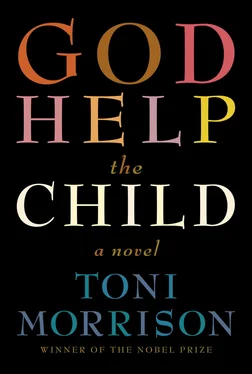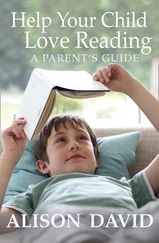“Can I fix you some breakfast? Oatmeal?” she asked. “Or some warm bread and butter. You must have been trapped in there all night.”
Bride declined, sweetly, she hoped. She just wanted to take a nap.
Evelyn tucked the blanket around her guest, mindful of the propped-up leg, and did not trouble to whisper the black or white kitten conversation as she moved toward the sink. She was a tall woman with unfashionable hips and a long chestnut braid swinging down her back. She reminded Bride of someone she had seen in the movies, not a recent one but something made in the forties or fifties when film stars had distinguishing faces unlike now, when hairstyles alone separated one star from another. But she could not put a name to the memory — actress or film. Little Raisin, on the other hand, resembled no one Bride had ever seen — milk-white skin, ebony hair, neon eyes, undetermined age. What had Evelyn said? “That is where we found her”? In the rain.
Steve and Evelyn’s house seemed to be a converted studio or machine shop: one large space, containing table, chairs, sink, wood-burning cook stove and the scratchy couch Bride lay on. Against a wall stood a loom with small baskets of yarn nearby. Above was a skylight that needed a good power-cleaning. All over the room, light, unaided by electricity, moved like water — a shadow here could be gone in an instant, a shaft hitting a copper pot might take minutes to dissolve. An open door to the rear revealed a room where two beds, one of rope, another of iron, stood. Something meaty, like chicken, roasted in the oven while Evelyn and the girl chopped mushrooms and green peppers at the rough home-made table. Without warning they began to sing some dumb old hippie song.
“This land is your land, this land is my land…”
Bride quickly dashed a bright memory of Sweetness humming some blues song while washing panty hose in the sink, little Lula Ann hiding behind the door to hear her. How nice it would have been if mother and daughter could have sung together. Embracing that dream, she did fall into a deep sleep, only to be awakened around noon by booming male voices. Steve, accompanied by a very old, rumpled doctor, clumped into the house.
“This is Walt,” said Steve. He stood near the couch, showing something close to a smile.
“Dr. Muskie,” said the doctor. “Walter Muskie, MD, PhD, LLD, DDT, OMB.”
Steve laughed. “He’s joking.”
“Hello,” said Bride, looking back and forth from her foot to the doctor’s face. “I hope it’s not too bad.”
“We’ll see,” answered Dr. Muskie.
Bride sucked air through clenched teeth as the doctor sliced through her elegant white boot. Expertly and without empathy he examined her ankle and announced it fractured at the least and unfixable here in Steve’s house — she needed to go to the clinic for an X-ray, cast and so on. All he could do, or would do, is clean and bind it so its swell wouldn’t worsen.
Bride refused to go. She was suddenly so hungry it made her angry. She wanted to bathe and then eat before being driven to another tacky rural clinic. Meantime she asked Dr. Muskie for painkillers.
“No,” said Steve. “No way. First things first. Besides, we don’t have all day.”
Steve carried her to his truck, squeezed her between himself and the doctor and took off. Two hours later as the two of them drove back from the clinic she had to admit the splint had eased her pain, as had the pills. Whiskey Clinic was across the street from a post office on the first floor of a charming sea-blue clapboard house, which also contained a barbershop. Windows on the second floor advertised used clothes. Quaint, thought Bride, expecting to be helped into an equally quaint examination room. To her surprise the equipment was as cutting edge as her plastic surgeon’s.
Dr. Muskie smiled at her astonishment. “Loggers are like soldiers,” he said. “They have the worst wounds and need the best and quickest care.”
After examining the screen-shot from a sonogram, Dr. Muskie told her she would live but she would probably need a month at the least to heal — maybe six weeks. “Syndesmosis,” he said to his uncomprehending patient. “Between the fibula and the tibia. Maybe surgery — probably not, if you do what I say.”
He put her ankle in a splint, saying he would give her a cast when the swelling decreased. And she would have to come back to his office for it.
An hour later she was back in the truck sitting next to a silent Steve with her left leg sticking as straight under the dashboard as the splint allowed. After being carried back to the house, Bride found that her earlier hunger had dissipated as the awareness of being unwashed and sour-smelling overwhelmed her.
“I’d like to take a bath, please,” she said.
“We don’t have a bathroom,” said Evelyn. “I can sponge you for now. When your ankle is ready, I’ll heat water for the washtub.”
Slop jar, outhouse toilet, metal washtub, broke-down scratchy couch for a month? Bride started to cry, and they let her while Rain and Evelyn went on preparing a meal.
Later, after the family finished eating, Bride tried to overcome her embarrassment and accepted a basin of cold water to rinse her face and armpits. Then she roused herself enough to smile and take the plate Evelyn held before her. Quail, as it turned out, not chicken, with thick mushroom gravy. Following the meal, Bride felt more than embarrassed; she was ashamed — crying every minute, petulant, childish and unwilling to help herself or accept aid gracefully from others. Here she was among people living the barest life, putting themselves out for her without hesitation, asking nothing in return. Yet, as was often the case, her gratitude and embarrassment were short-lived. They were treating her like a stray cat or a dog with a broken leg that they felt sorry for. Sullen and picking at her fingernails, she asked Evelyn whether she had a nail file or any nail polish. Evelyn grinned and held up her own hands without speaking. Point taken — Evelyn’s hands were less for holding the stem of a wineglass and more for chopping kindling and wringing the necks of chickens. Who are these people, wondered Bride, and where did they come from? They hadn’t asked her where she was from or where she was going. They simply tended her, fed her, arranged for her car to be towed for repair. It was too hard, too strange for her to understand the kind of care they offered — free, without judgment or even a passing interest in who she was or where she was going. She wondered on occasion if they were planning something. Something bad. But the days passed with boredom unbroken. Steve and Evelyn occasionally spent time after supper sitting outside singing songs by the Beatles or Simon and Garfunkel — Steve strumming his guitar, Evelyn joining him in tuneless soprano. Their laughter tinkling between wrong lines and missed notes.
In the following weeks of more visits to the clinic, leg exercises and waiting for the Jaguar to be repaired, Bride learned that her hosts were in their fifties. Steve had graduated from Reed College, Evelyn from Ohio State. With constant bursts of laughter they described how they met. First in India (Bride saw the light of pleasant memories shining in the looks they exchanged), then London, again in Berlin. Finally in Mexico they agreed to stop meeting that way (Steve touched Evelyn’s cheek with his knuckle) so they got married in Tijuana and “moved to California to live a real life.”
Bride’s envy watching them was infantile but she couldn’t stop herself. “By ‘real’ you mean poor?” She smiled to hide the sneer.
“What does ‘poor’ mean? No television?” Steve raised his eyebrows.
“It means no money,” said Bride.
“Same thing,” he answered. “No money, no television.”
Читать дальше











